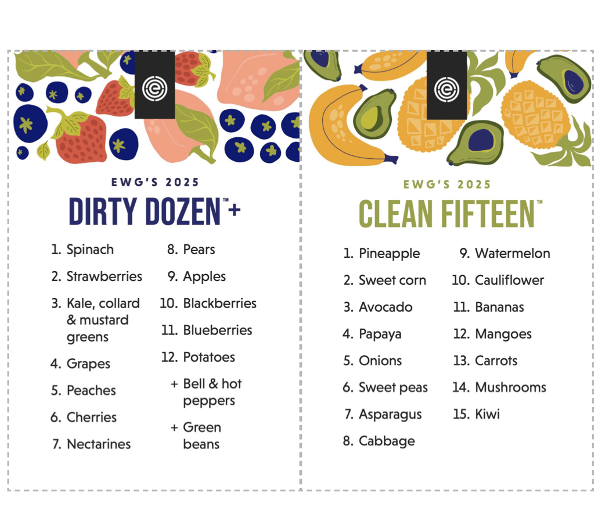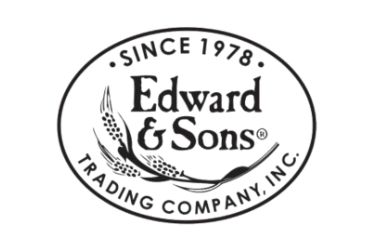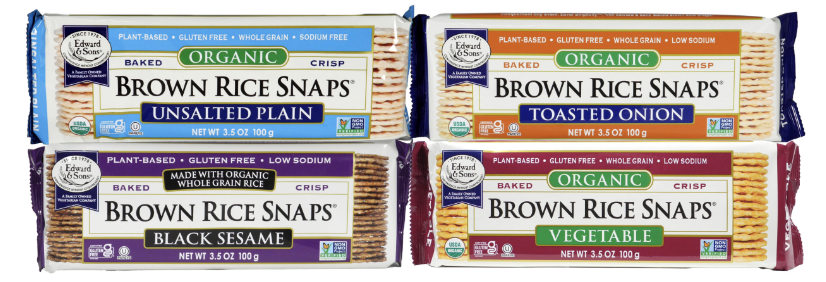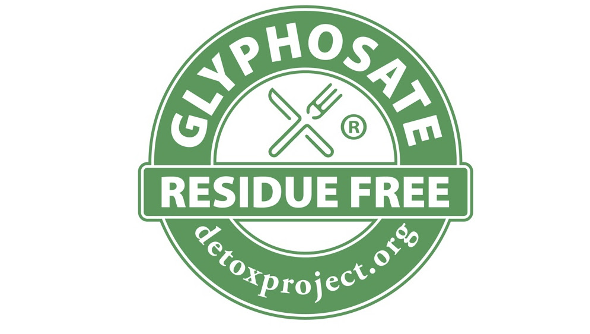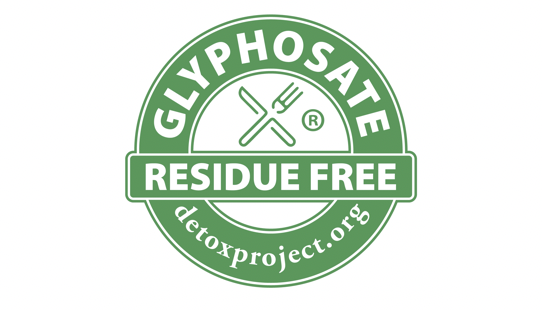EWG Publishes ‘Clean 15’ to Reduce Dietary Pesticide Exposure; Study Shows Glyphosate Still Carcinogenic at Levels Deemed Safe
This article first appeared in the July 2025 issue of Presence Marketing’s newsletter.
By Steven Hoffman
As public awareness of the connection between food and health continues to grow, so too does concern over pesticide residues in the food we eat every day. This month, two major developments underscore just how crucial it is to pay attention not only to what’s on our plates — but how it got there.
On June 11, the Environmental Working Group (EWG) released its 2025 Shopper’s Guide to Pesticides in Produce, including the highly anticipated “Clean Fifteen” and “Dirty Dozen” lists. These guides rank popular fruits and vegetables based on pesticide contamination, using data compiled from the USDA and FDA. For nearly two decades, these rankings have helped consumers make more informed decisions about when buying organic matters most.
This year’s “Clean Fifteen” offers some good news: Nearly 60% of the tested samples of the 15 least-contaminated conventional produce items showed no detectable pesticide residues whatsoever. Topping the clean list were avocados, sweet corn, pineapple, onions, and papaya — all relatively safe bets for budget-conscious shoppers looking to reduce pesticide intake without going fully organic.
But the release of EWG’s guide was accompanied by sobering news on another front: The results of a two-year study published in Environmental Health adds to a growing body of evidence suggesting that glyphosate — the active ingredient in Bayer-Monsanto’s Roundup®, the world’s most widely used herbicide — may cause multiple types of cancer, and at doses considered safe by regulators.
“Our study provides solid and independent scientific evidence of the carcinogenicity of glyphosate and glyphosate-based herbicides,” said lead investigator Daniele Mandrioli of the Ramazzini Institute in Italy.
Glyphosate and the American Diet
Glyphosate has been a mainstay of industrial agriculture since the 1970s, praised for its broad-spectrum weed-killing power. With the rise of genetically modified crops engineered to resist glyphosate, its use exploded in the late 1990s and 2000s. Today, it’s sprayed on millions of acres of GMO corn, soybeans, cotton, and canola. But it doesn’t stop there.
In conventional grain production, glyphosate is also used as a desiccant — sprayed just before harvest to dry out crops like oats, wheat, lentils, and chickpeas. That means it doesn’t just show up in livestock feed. It ends up in our breakfast bowls and lunchboxes: in oatmeal, crackers, tortillas, hummus, and cereal — it can even end up in products marketed as “natural” or “healthy.”
Glyphosate is now so prevalent in our environment that it has been detected in everything from rainwater to breast milk. A 2022 CDC study found glyphosate in the urine of 80% of a representative sample of U.S. children and adults. Just last year, EWG reported that popular oat-based cereals and snack bars still contained detectable glyphosate residues, years after promising to reformulate.
So, how dangerous is it?
A Closer Look at the Science
The new Environmental Health study, published in June 2025, evaluated nearly 2,000 previously published studies to reassess glyphosate’s potential health risks. It concluded that even very low doses — far lower than currently allowed by regulatory agencies — can pose significant risks of cancer, hormone disruption, reproductive harm, and immune suppression. The researchers found that glyphosate can interfere with endocrine signaling pathways at parts-per-billion levels, meaning even tiny exposures could be biologically active.
This follows a 2015 determination by the World Health Organization’s International Agency for Research on Cancer (IARC), which classified glyphosate as a “probable human carcinogen.” Since then, thousands of lawsuits have been filed against Bayer-Monsanto, many resulting in high-profile jury verdicts linking glyphosate exposure to non-Hodgkin’s lymphoma. Although Bayer continues to deny glyphosate’s carcinogenicity and has spent billions to settle lawsuits, public confidence in the safety of this chemical is eroding.
And now, with researchers warning there may be no safe level of exposure, the need for regulatory reassessment — and consumer action — is more urgent than ever.
What the ‘Clean Fifteen’ Tells Us — and What It Doesn’t
In the midst of all this, EWG’s Shopper’s Guide to Pesticides in Produce offers a valuable, practical resource for consumers trying to navigate the complexity of the modern food system.
EWG analyzed over 47,000 samples of 46 popular fruits and vegetables. The “Clean Fifteen” list identifies produce items that typically have the lowest pesticide levels, even when grown conventionally. This year’s top 15 are:
Avocados
Sweet corn
Pineapple
Onions
Papaya
Frozen sweet peas
Asparagus
Honeydew melon
Kiwi
Cabbage
Watermelon
Mushrooms
Mangoes
Sweet potatoes
Carrots
It’s worth noting that some of these crops, such as papaya and sweet corn, are frequently genetically modified. That means they may be lower in pesticide residues, but still part of the chemical-dependent industrial agriculture model.
In contrast, the “Dirty Dozen” — which includes strawberries, spinach, and kale — are best purchased organic due to their high pesticide loads. For instance, 90% of strawberry samples tested had detectable pesticide residues, and spinach samples had, on average, 1.8 times more pesticide residues by weight than any other crop.
The takeaway: if you can’t afford to buy everything organic, prioritize organic options for items on the Dirty Dozen, and rest a bit easier when purchasing from the Clean Fifteen.
Resources & References
EWG Shopper’s Guide to Pesticides in Produce: https://www.ewg.org/foodnews/
Glyphosate cancer study summary: https://www.thenewlede.org/2025/06/new-study-adds-to-evidence-that-glyphosate-weed-killer-can-cause-cancer/
Steven Hoffman is Managing Director of Compass Natural Marketing, a strategic communications and brand development agency serving the natural and organic products industry. Learn more at www.compassnatural.com.
Edward & Sons® Organic Rice Crackers Leads List of Gluten Free Products with Zero Detectable Levels of Glyphosate
Consumer advocacy group Moms Across America had 46 gluten free food products tested for glyphosate residues; Edward & Sons® Organic Brown Rice Snaps® was one of only two products that had zero detectable levels of the toxic, synthetic herbicide.
CARPINTERIA, Calif. (July 9, 2024) – According to a new report by Moms Across America, a nonprofit consumer advocacy group, 46 samples of organic and non-organic gluten free foods were tested for glyphosate – the most widely used herbicide in the world and one linked to a variety of health issues. The results showed that 44 out of 46 samples contained glyphosate residues. Moreover, the tests revealed that not all organic, gluten free products were free of glyphosate.
However, one organic product line, Edward & Sons Organic Brown Rice Snaps®, had no detectable levels of glyphosate, according to Moms Across America’s test results.
For a summary of the results, visit here.
In the U.S., 12% of men and 9% of women report eating gluten free diets. Globally, approximately 660 million people avoid gluten. It also is estimated that 1 in 100 people worldwide are affected by celiac disease.
"Moms Across America was thrilled to find that Edward & Sons' rice crackers, a staple in many of our homes, had no detectable level of glyphosate. Only two gluten free products out of the 46 samples tested achieved this status,” said Zen Honeycutt, Founder and Executive Director of Moms Across America.
“In an increasingly toxic environment, for a product not to be contaminated with glyphosate is no small feat. It takes integrity and commitment to source clean ingredients, and we are thrilled to celebrate companies that are producing safe, nontoxic, quality foods. We hope many brands are inspired by the results and urge their suppliers to discontinue glyphosate and all toxic agrochemical use and transition to regenerative and organic farming for a thriving future. Thank you, Edward & Sons!" Honeycutt added.
“It has become increasingly challenging for all of us to avoid contaminants in our food, water and air,” explained Joel Dee, Founder and Director of leading organic and plant-based foods pioneer Edward & Sons Trading Company, Inc. “At Edward & Sons, we take the challenge seriously. We are proud of the recognition received by our organic baked Brown Rice Snaps. It validates the selection and practices of our farmer-partners. Their commitment to organic agriculture nurtures their local ecology, protects farmers and consumers, and makes possible the most delicious and nutritious foods we can offer.”
Glyphosate, a synthetic herbicide originally patented in 1974 by the Monsanto Company, is known as the active ingredient in Roundup®-branded herbicides. According to watchdog group U.S. Right to Know, Monsanto reportedly removed glyphosate-based herbicides from the U.S. consumer market in 2023, but it is still widely used in commercial agriculture. In 2022, researchers at the National Center for Environmental Health, Centers for Disease Control and Prevention detected glyphosate in the urine of 81% of Americans over six years of age.
“We believe that gluten-free manufacturers are challenged to find clean ingredients for their products because the U.S. government allows so many harmful agrochemicals to be used,” Honeycutt said in the report. Testing for the Moms Across America investigation was conducted by an accredited laboratory, Health Research Institute Laboratories. For the full glyphosate laboratory test results visit here.
About Edward & Sons
Offering a unique portfolio of plant-based, natural, sustainable and organic grocery brands since 1978, including Native Forest®, Edward & Sons, Let’s Do Organic® and more, Edward & Sons Trading Company, Inc. is known for its convenient and nourishing foods that support local economies and the environment. An independently owned business based in Carpinteria, California, Edward & Sons is committed to providing health-conscious consumers “Convenience Without Compromise®.” For more information,visit www.EdwardandSons.com and follow us on Facebook, TikTok and Instagram.
Media Contact
Steven Hoffman, Compass Natural, steve@compassnatural.com, tel 303.807.1042
Mamavation Hosts Massive Glyphosate Free Product Giveaway to Begin Feb. 7
FOR IMMEDIATE RELEASE
Leah Segedie, founder of Mamavation.com, will host a product giveaway that concentrates on Glyphosate Free brands from all over North America.
What: Mamavation’s Big Glyphosate-Free Giveaway
When: Feb. 7-14, 2023
Where: Two giveaways on Mamavation and one on Instagram
Info: Mamavation.com
LOS ANGELES (February 6, 2023) – Mamavation, an eco-wellness community for women interested in safe products for their homes and families, will host a giveaway of glyphosate-free products from Feb. 7-14 on their website and Instagram.
The community has a reach through its email list and social media platforms of over 300,000 consumer advocates and influencers who are interested in monitoring the levels of toxic chemicals in commonly used products.
“Mamavation consumers are in love with brands that provide more transparency in this constantly changing world,” said Mamavation founder Leah Segedie. “This is why we are happy to support brands that have gone that extra mile to prove they are free from the toxic herbicide glyphosate."
Sponsors will donate a range of products worth a total of more than $4,000, which will be divided among three winners.
The post on Mamavation.com will discuss glyphosate, ways to avoid it, current news or interesting topics and the giveaway. The site will also go into detail on how a brand becomes Glyphosate Residue Free.
Glyphosate is one of the world’s most widely used pesticides, applied primarily as an herbicide and often also as a pre-harvest drying aid in major crops such as oats, wheat and pulses. Outside of agriculture it is widely used as a weed killer for parks and gardens in products such as Roundup. As consumers become aware of the dangers of glyphosate contamination in their food supply, many are turning to the Glyphosate Residue Free (GRF) certification seal for peace of mind as they choose their groceries.
Natural Product Brands Respond to Benefit of GRF Seal
Natural product brands responded positively to the giveaway and support testing for toxic chemicals, especially glyphosate, which is widely used. Joline Rivera, who donated products for the giveaway from her Chicago-based Red Belly Honey company, said that she places a high value on the “tenacity and will it takes to be glyphosate residue-free” and that her audience is “very impressed” by certifications, so the company pays special attention to them. She says the company was involved early in the labeling movement in California and takes it seriously.
“Issues surrounding glyphosate are very familiar to us — knowing our product is pesticide-free tells our customers we care about what they’re putting into their bodies,” Rivera said. “We have a motto around here … if it has to do with helping people feel better and bees living longer — it has to do with Red Belly Honey."
Paul Greive, founder and vice president of sales and marketing of Pasturebird.com, which sells pasture-raised chicken, said consumers have found loopholes in the food labeling system and seek greater transparency from companies claiming to sell safe and healthy food. “The Glyphosate Residue Free label provides consumers with an unbiased, lab-based verification that their food is free of glyphosate,” Greive said. “We’re excited to partner with Mamavation and The Detox Project to bring the integrity and transparency that modern consumers expect.”
The Detox Project provides Glyphosate Residue Free certification, which verifies that products do not contain the world’s most used herbicide. These types of certification are growing fast in the U.S. and around the world as consumers become more concerned about toxic chemicals in their food and household products. Products are tested by independent laboratories and must meet stringent standards to use the certification.
Frank Bergin, president of North Stonington, Connecticut-based Jovial Foods, recalls that, when he heard about The Detox Project, he “fell in love with their mission” because transparency in the food industry has become so important to consumers. “We owe it to consumers to be transparent about ingredients,” he said. Mamavation shares their mission to help consumers find non-toxic food, Bergin said. “We are so excited to partner with them for the first-ever Big Glyphosate Free Giveaway this month!” he added.
Consumers can begin entering the contest on the Mamavation website on Feb. 7.
About Mamavation
Mamavation, founded by Leah Segedie, is an online community and investigative service that empowers women through eco-wellness. Mamavation focuses on wellness as a lifestyle, health for everyone and sustainability. It is a judgment-free zone of women from all walks of life – from deep green to light green, united by a determination to provide healthier homes, support the brands that create better products, and treat other women with respect and dignity. Mamavation has been investigating grocery store products and food for several years and has a list of recommended toxic-free products.
For more information, visit Mamavation at www.mamavation.com or contact leah@mamavation.com. Follow Mamavation on Facebook, Instagram, Pinterest, Twitter and YouTube.
About the Glyphosate Residue Free Certification Program
Glyphosate Residue Free certification verifies that a specific food, supplement or beauty product does not contain the world’s most used herbicide. Glyphosate Residue Free certification is one of the fastest growing certifications in the U.S. and around the world. You can find the brands and the products that are already certified here. A third-party ISO 17025 accredited laboratory regularly tests certified products to make sure they do not contain glyphosate residues. To be certified Glyphosate Residue Free, products must have no glyphosate residues down to government-recognized limits of detection (LODs) for food, commodity and supplement samples (usually 0.01 ppm), and lower levels than default government Maximum Residue Limits (MRLs) in the European Union and Japan.
For more information, visit The Detox Project at www.detoxproject.org or contact info@detoxproject.org. Follow The Detox Project and the Glyphosate Residue Free Certification Program on Instagram, Facebook, Twitter and LinkedIn.
Media Contacts
Leah Segedie, Mamavation, leah@mamavation.com
Steven Hoffman, Compass Natural, steve@compassnaturalmarketing.com
'Glyphosate Residue Free' Certification Market Jumps 21% as Consumers Demand 'Clean Food' Labeling, Transparency
'Glyphosate Residue Free' Certification Market Jumps 21% as Consumers Demand 'Clean Food' Labeling, Transparency
October 25, 2022
More than 100 brands have been certified by The Detox Project’s Glyphosate Residue Free verification program to ensure their food, beverage, dietary supplement, and personal care products are free of glyphosate residues, driven by rising demand among consumers wanting to minimize exposure to this pervasive weed killer.
FOR IMMEDIATE RELEASE
BOULDER, CO — As more health-conscious consumers seek to avoid toxic chemicals and pesticides in their foods, The Detox Project reported the “Glyphosate Residue Free” (GRF) certification market grew more than 20% in the past year to nearly $800 million, with a growing number of companies seeing the value of displaying the certification seal on their products.
Third-party, independent data from leading natural and organic products industry market research firm SPINS, revealed that the Glyphosate Residue Free certification market reached USD $778 million in Q3 of 2022, an increase of 21.2% YoY. Glyphosate Residue Free certification is now one of the fastest growing certification programs in the U.S. and the world. The certification verifies that a specific food, dietary supplement, or personal care product does not contain glyphosate residues.
“It’s getting increasing tough for consumers to decipher what products are truly healthy in the market. Certifications like Glyphosate Residue Free give them peace of mind that the products they certify are clean and safe for consumers and their families. That trust and assurance is proven in the growth and impact in sales for products that carry the Glyphosate Residue Free Certification,” says Megan Mahon, SPINS Product Intelligence Partnerships Program Manager.
Glyphosate is one of the world’s most widely used pesticides, applied primarily as an herbicide and often also as a pre-harvest drying aid in major crops such as oats, wheat, and pulses. Outside of agriculture it is widely used as a weed killer for parks and gardens in products such as Roundup. As consumers become aware of the dangers of glyphosate contamination in their food supply, many are turning to the GRF certification seal for peace of mind as they choose their groceries.
Leading Brands Display the Glyphosate Residue Free Certification Seal
Responding to consumer concerns over glyphosate, leading natural, organic and specialty brands such as Oatly, Chobani, Califia Farms, MegaFood, Chosen Foods, Puris, Uncle Matt’s Organic, Jovial Foods and Nutiva are amongst the more than 100 brands that have certified some or all their products as Glyphosate Residue Free (GRF). The American e-commerce membership-based retailer Thrive Market has also thrown its support behind the GRF certification.
“Natural brands in food, personal care and supplements are taking notice because the Glyphosate Residue Free seal is beginning to gain traction in retail buying circles,” said Henry Rowlands, Executive Director of The Detox Project. “The Glyphosate Residue Free certification program is our most important work because it brings widespread awareness of this toxic chemical that has been proven harmful to both humans and the environment. I am thrilled to see the increase in companies using the certification and happy to know that consumers have this information to use when choosing groceries for their families.”
Glyphosate has been a major topic on social media and in the mainstream media over the past few years with three focal points creating quite a stir:
A Working Group of 17 experts from 11 countries met at the International Agency for Research on Cancer (IARC) on March 3-10, 2015, to review the available published scientific evidence and evaluate the carcinogenicity of five organophosphate insecticides and herbicides: diazinon, glyphosate, malathion, parathion, and tetrachlorvinphos. The review led to IARC classifying glyphosate as “probably carcinogenic to humans.”
In 2020, Bayer agreed to pay more than $10 billion to settle cancer suits that were bought against the company due to the fact that their glyphosate-based herbicide Roundup causes Non-Hodgkin’s Lymphoma.
Multiple recent studies have shown that glyphosate-based herbicides are causing massive damage to pollinators, which are the backbone of the global food supply.
Consumers have been paying close attention and the interest in avoiding this toxic chemical is only set to grow. Businesses and brands wishing to learn more about, and to participate in, the Glyphosate Residue Free Certification Program, please visit the Detox Project or contact info@detoxproject.org.
About the Glyphosate Residue Free Certification Program
Glyphosate Residue Free certification verifies that a specific food, supplement or beauty product does not contain the world’s most used herbicide. Glyphosate Residue Free certification is one of the fastest growing certifications in the U.S. and around the world. You can find the brands and the products that are already certified here. A third-party ISO 17025 accredited laboratory regularly tests certified products to make sure they do not contain glyphosate residues. To be certified Glyphosate Residue Free, products must have no glyphosate residues down to government-recognized limits of detection (LODs) for food, commodity, and supplement samples (usually 0.01 ppm), and lower levels than default government Maximum Residue Limits (MRLs) in the European Union and Japan.
For more information, visit The Detox Project website at www.detoxproject.org or contact info@detoxproject.org. Follow The Detox Project and the Glyphosate Residue Free Certification Program on Instagram, Facebook, Twitter and LinkedIn.
Learn More
”What Does It Mean for Food to Have a ‘Glyphosate Residue Free’ Label?” by Martha Stewart Magazine
“Weedkiller Ingredient Tied to Cancer Found in 80% of U.S. Urine Samples” by The Guardian
“Avoiding Toxins In Our Food: Be Informed” by The Union
“The Poison in Our Daily Bread: Glyphosate Contamination Widespread in Essential Foods” by The Detox Project
“New Report Alleges ‘Mass Contamination’ of Foods from Use of Glyphosate to Dry Crops” by Food Navigator-USA
“The Detox Project Becomes Signing Node for Most Sustainable Blockchain in the World” by Medium
Media Contacts
Steve Hoffman, Compass Natural Marketing, steve@compassnaturalmarketing.com, tel 303.807.1042
Henry Rowlands, The Detox Project, info@detoxproject.org

